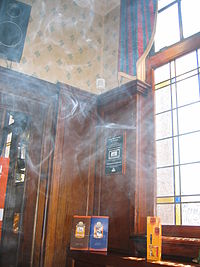
Photo from wikipedia
If two partners smoke, their quit behavior may be related through correlation in unobserved individual characteristics and through common shocks. However, there may also be a causal effect whereby the… Click to show full abstract
If two partners smoke, their quit behavior may be related through correlation in unobserved individual characteristics and through common shocks. However, there may also be a causal effect whereby the quit behavior of one partner is affected by the quit decision of the other partner. If so, there is a spousal peer effect on the decision to quit smoking. We use data containing retrospective information of Dutch partnered individuals about their age of onset of smoking and their age of quitting smoking. We estimate mixed proportional hazard models of starting rates and quit rates of smoking in which we allow unobserved heterogeneity to be correlated across partners. Using a timing of events approach, we determine whether the quitting-to-smoke decision of one partner has a causal effect on the quitting-to-smoke decision of the other partner. We find no evidence of substantial spousal peer effects in the decision to quit smoking. Apparently, love conquers all but nicotine addiction. Copyright © 2017 John Wiley & Sons, Ltd.
Journal Title: Health Economics
Year Published: 2017
Link to full text (if available)
Share on Social Media: Sign Up to like & get
recommendations!